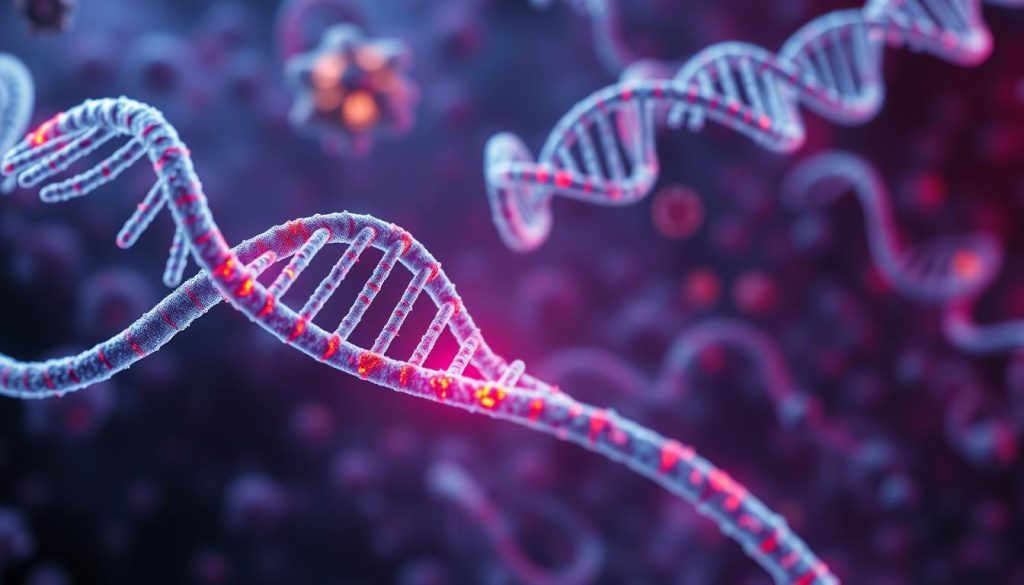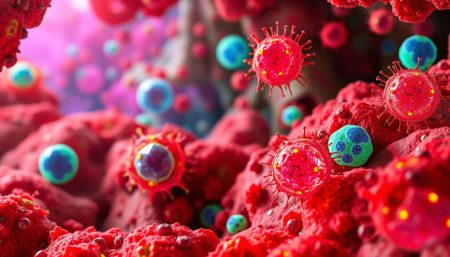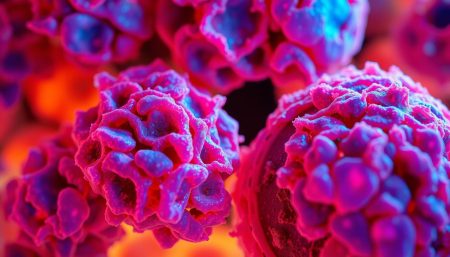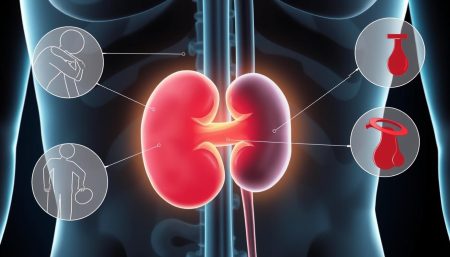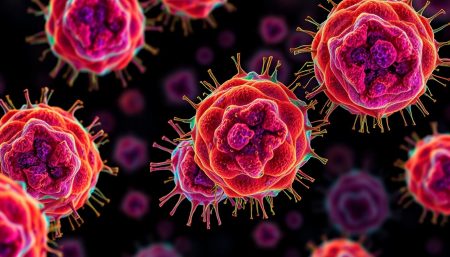Research into epigenetics has given us new insights into prostate cancer. DNA methylation is a key process that controls how genes work. In prostate cancer, this balance is often disrupted, causing cells to grow abnormally and form tumors.
Demethylation, or the removal of methyl groups from DNA, is crucial in prostate cancer. It can turn on genes that were once off, including those that help tumors grow. By understanding how methylation and demethylation work in prostate cells, we can find new ways to diagnose and treat the disease.
Let’s dive into how demethylation affects prostate cancer. We’ll look at its mechanisms, how it changes gene expression, and its potential in treatments. This knowledge is key to creating targeted treatments and improving care for prostate cancer patients.
Understanding Demethylation and Its Basic Mechanisms
DNA methylation is key to controlling gene expression. It adds methyl groups to DNA, silencing genes. Demethylation, the removal of these groups, is vital for cell functions.
The Chemistry Behind DNA Methylation and Demethylation
DNA methylation happens when a methyl group attaches to a cytosine base. This usually occurs at CpG sites. Demethylation removes these groups, allowing genes to be expressed again.
Key Enzymes Involved in Demethylation Processes
Several enzymes help with demethylation. TET proteins are key, oxidizing methylated cytosines. This is vital for understanding demethylation in diseases like prostate cancer.
| Enzyme | Function | Impact on Gene Expression |
|---|---|---|
| TET1 | Oxidizes 5-methylcytosine | Activates previously silenced genes |
| TET2 | Converts 5-methylcytosine to 5-hydroxymethylcytosine | Promotes gene activation |
| DNMT3A | Establishes DNA methylation patterns | Regulates gene silencing |
Natural Occurrence of Demethylation in Cellular Functions
Demethylation is natural in embryonic development and cell differentiation. It’s crucial for resetting gene expression. However, too much demethylation can lead to cancer.
Demethylation is a double-edged sword. While vital for normal cell function, aberrant demethylation can lead to disease states, including cancer.
What Is The Role Of Demethylation In Prostate Cancer
Demethylation is key in prostate cancer. It changes how genes work, affecting how cells grow and divide. In cancer, it turns on genes that promote growth and turns off genes that stop it.
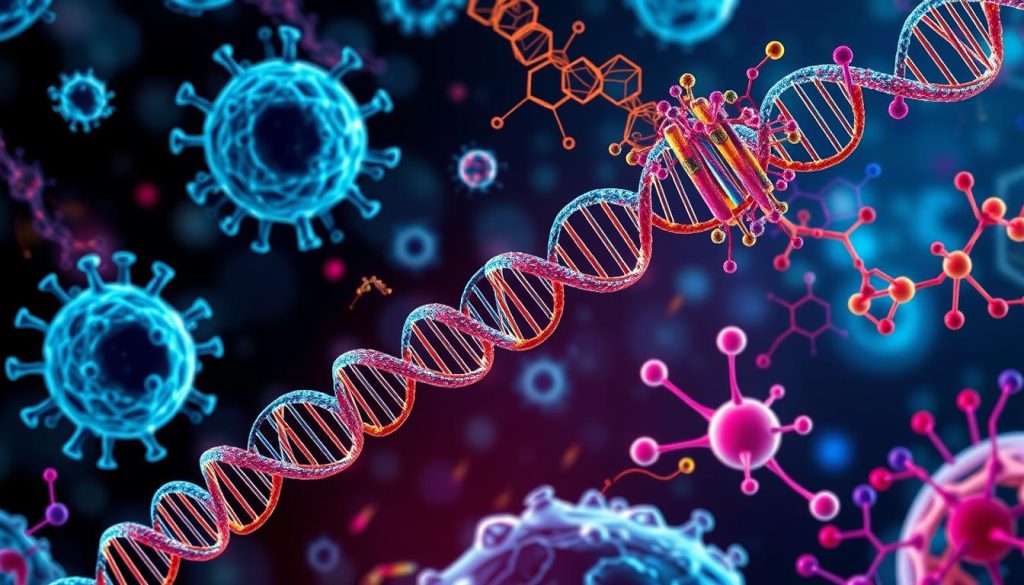
Oncogenes, turned on by demethylation, push cells to grow without control. This happens when DNA loses methyl groups. On the other hand, tumor suppressor genes are silenced, stopping them from stopping bad cell growth.
Studies show prostate cancer cells have different methylation patterns than healthy cells. These changes impact genes involved in cell growth, DNA repair, and more.
- Cell cycle regulation
- DNA repair mechanisms
- Apoptosis (programmed cell death)
- Angiogenesis (formation of new blood vessels)
Understanding demethylation in prostate cancer is vital for new treatments. Researchers look for methylation changes to create better treatments.
“Epigenetic modifications, including demethylation, are emerging as key players in prostate cancer. They offer new avenues for both diagnosis and treatment.”
As scientists learn more, they find links between demethylation and cancer outcomes. This leads to personalized medicine, where treatments fit each person’s methylation profile.
DNA Methylation Patterns in Healthy Prostate Tissue vs. Cancer Cells
DNA methylation is key to how genes work and cells behave. In healthy prostate tissue, it keeps cells in line. But, when it goes wrong, it can cause cancer.
Normal Methylation Patterns in Prostate Tissue
Healthy prostate cells have certain DNA methylation patterns. These patterns control gene expression, keeping cell growth and division in check. Some genes are methylated, while others are not, to help the prostate work right.
Altered Methylation Signatures in Cancer Development
In prostate cancer, these patterns change a lot. Genes that should be unmethylated become methylated, silencing important genes. Other genes lose methylation, causing oncogenes to overexpress. These changes are a big part of cancer’s epigenetics.
Impact on Gene Expression and Cell Regulation
The methylation changes deeply affect gene expression in prostate cancer cells. This leads to uncontrolled cell growth and division. Knowing about these changes is crucial for new diagnostic tools and treatments.
| Feature | Healthy Prostate Tissue | Prostate Cancer Cells |
|---|---|---|
| Tumor Suppressor Genes | Unmethylated, active | Often methylated, silenced |
| Oncogenes | Methylated, controlled | Often unmethylated, overexpressed |
| Cell Growth | Regulated | Uncontrolled |
| DNA Repair Genes | Active | Often silenced |
These unique methylation patterns could be early signs of prostate cancer. By looking at these changes, researchers hope to find better ways to diagnose and treat the disease.
Epigenetic Modifications and Prostate Cancer Progression
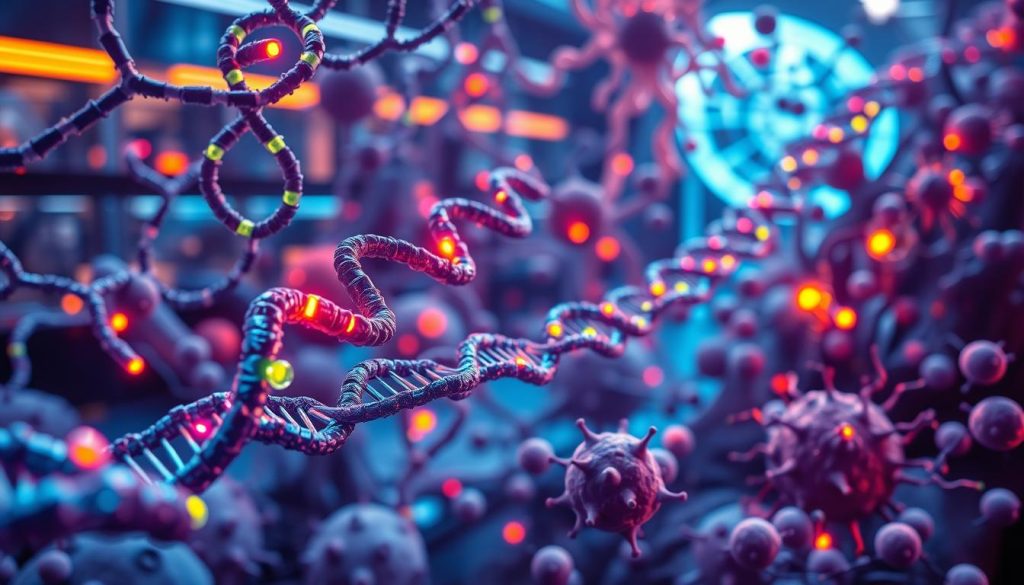
Epigenetic changes are key in prostate cancer development. They change how genes work without altering DNA. Hypomethylation, for example, can turn on genes that help tumors grow.
DNA methylation patterns change a lot in cancer cells. Tumor suppressor genes are often silenced, while oncogenes are turned on. This imbalance makes cancer grow and treatment hard.
As prostate cancer grows, so do the epigenetic changes. They affect:
- Tumor growth rate
- Metastatic potential
- Response to therapy
Researchers are looking into how these changes affect the disease. They hope to find new ways to treat it.
“Epigenetic modifications are like a conductor, orchestrating the symphony of genes in cancer cells. By studying these changes, we hope to find new ways to silence the discord and restore harmony.”
Targeting epigenetic mechanisms could help treat prostate cancer. Drugs that fix methylation problems are being tested. They aim to turn on tumor suppressor genes and stop cancer.
The relationship between genetics and epigenetics in prostate cancer is complex. Ongoing research aims to understand this better. This could lead to treatments tailored to each patient.
Clinical Applications of Demethylation in Cancer Treatment
Demethylation is key in prostate cancer treatment. It has opened new ways to fight cancer by changing DNA methylation patterns. Let’s look at where we are now and where we might go with demethylation treatments.
Current Therapeutic Approaches Using Demethylating Agents
Demethylating agents are powerful in fighting cancer. They stop DNA methyltransferases, enzymes that keep methylation patterns. In prostate cancer, they can turn on genes that help fight tumors.
| Demethylating Agent | Mechanism | Application in Prostate Cancer |
|---|---|---|
| Azacitidine | Incorporates into DNA, inhibits DNMTs | Used in advanced metastatic prostate cancer |
| Decitabine | Similar to azacitidine, more potent | Tested in castration-resistant prostate cancer |
| Guadecitabine | Next-generation DNMT inhibitor | Under investigation for various prostate cancer stages |
Combination Therapies and Their Effectiveness
Using demethylating agents with other treatments is showing great results. For example, mixing these drugs with immunotherapy makes tumors more visible to the immune system.
Future Treatment Possibilities and Research Directions
The field of epigenetic therapy is growing fast. Scientists are working on targeted demethylation to reduce side effects and boost results. Gene-specific demethylation, using CRISPR, is a promising area in prostate cancer treatment.
“Epigenetic therapy holds immense potential for revolutionizing cancer treatment. By understanding and manipulating DNA methylation patterns, we can unlock new ways to combat prostate cancer and improve patient outcomes.”
Biomarkers and Diagnostic Applications in Prostate Cancer
Epigenetic changes, like DNA methylation patterns, are becoming key biomarkers for prostate cancer diagnosis. These molecular signatures help detect and track the disease. They could lead to better patient outcomes.
Methylation-Based Diagnostic Tools
Scientists have created tests that examine specific methylation patterns in prostate tissue or fluids. These tools help doctors find cancer early and accurately. For instance, some tests look at methylation changes in genes related to prostate cancer. This gives doctors valuable insights for diagnosis.
Predictive Value of Methylation Patterns
Certain methylation patterns can predict a prostate cancer’s aggressiveness or treatment response. This info helps doctors and patients make informed care decisions. Recent studies on epigenetic factors show promise in guiding treatment choices and predicting outcomes in prostate cancer patients.
Early Detection and Monitoring Strategies
Methylation-based biomarkers are changing prostate cancer screening. These tests can spot cancer signs before traditional methods, leading to earlier treatment. They’re also good for monitoring patients after treatment, catching any disease return quickly. As research goes on, these biomarkers may become crucial in prostate cancer care, enhancing detection and treatment for many men.
FAQ
Q: What is demethylation and why is it important in prostate cancer?
A: Demethylation is when methyl groups are removed from DNA. In prostate cancer, it’s key because it can turn on genes that cause cancer or turn off genes that stop it. This helps researchers find new ways to diagnose and treat prostate cancer.
Q: How does DNA methylation differ between healthy prostate tissue and cancer cells?
A: Healthy prostate tissue has DNA methylation that keeps cells working right. But in cancer cells, this balance is broken. Some areas have too little methylation, and others have too much. These changes can affect how genes work, helping cancer grow and spread.
Q: Can demethylation be used as a therapeutic approach for prostate cancer?
A: Yes, demethylation is being looked at as a way to treat prostate cancer. Drugs that remove methyl groups are used in some treatments. They try to turn back on genes that stop cancer or turn off genes that cause it. Researchers are working on better ways to use these drugs.
Q: How are methylation patterns used as biomarkers for prostate cancer?
A: Methylation patterns are important for finding and predicting prostate cancer. Certain changes in genes can show if cancer is present or how it might grow. These markers are being turned into tools for early detection and tracking treatment success.
Q: What are the key enzymes involved in the demethylation process?
A: The demethylation process involves enzymes like TET enzymes. They change 5-methylcytosine to 5-hydroxymethylcytosine. DNA methyltransferases (DNMTs) also play a role by keeping methylation patterns in check. These enzymes are crucial for demethylation.
Q: How does epigenetic therapy differ from traditional cancer treatments?
A: Epigenetic therapy, like demethylation treatments, targets how genes are turned on or off. It doesn’t directly kill cancer cells like chemotherapy does. It aims to fix epigenetic changes that lead to cancer. This approach might have fewer side effects and help restore normal cell function.
Q: Can lifestyle factors influence DNA methylation patterns in prostate cancer?
A: Yes, lifestyle can affect DNA methylation in prostate cancer. Diet, exercise, stress, and environment can change epigenetic marks. For example, some nutrients can act as methyl donors. Knowing this could lead to new ways to prevent and treat prostate cancer.












